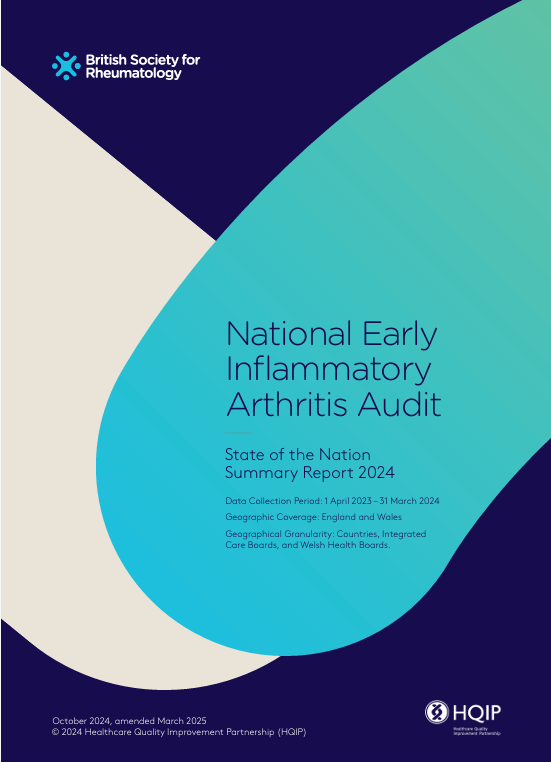Early inflammatory arthritis 2024 report (NEIAA)
The National Early Inflammatory Arthritis Audit (NEIAA) has published a State of the Nation Summary Report 2024. Based on data collected between 1 April 2023 and 31 March 2024 in England and Wales, it states that engagement with the project is more widespread than ever, with all eligible units returning some data since the last report, an increase from 96.4% to 100%.
Other key messages include:
- Improved treatment timeliness – the proportion of eligible patients starting disease-modifying antirheumatic drug (DMARD) therapy within six weeks of referral was 8% higher than reported in year five
- Remission rates within 12 weeks of treatment remain stable at 35%, however, geographic variation persists
- There is a significant burden of EIA symptoms on patients’ quality of life and employment
- There has been an increase in patient-reported mental health symptoms, continuing a trend over the last six years
- Waiting times for rare autoimmune rheumatic disease (RAIRD) diagnoses are highly variable.
The report also contains five recommendations which aim to enhance the quality of care for people living with EIA, reduce variation in care provision and outcomes, and ensure compliance with quality standards.
A NEIAA internal review in March 2025 discovered the following errors in the State of the Nation Report 2024.
- Outliers Appendix – Non-Participation Outline:
- The following NHS trusts were missing from the original list of non-participating units and have now been added:
- RXL Blackpool Teaching Hospitals NHS Foundation Trust
- RXP County Durham and Darlington NHS Foundation Trust
- RDB Milton Keynes University Hospital NHS Foundation Trust
- RA2 Royal Surrey NHS Foundation Trust
- Summary Report, Page 6 – Increased Engagement:
The text has been revised to: Engagement with the NEIAA project is more widespread than ever, with 86% of eligible units returning data since our last report, an increase from 82%.
- Summary Report, Page 8 – Impact of Stakeholder Engagement:
The text has been revised to: The increase in engagement from eligible units this year and the increase in recruitment of eligible cases, despite change to the audit’s data collection requirements, are directly attributable to these systematic and targeted stakeholder engagement efforts, alongside the instrumental work of the Getting it Right First Time programme.
- Summary Report, Page 5 & Standalone Infographic, Page 2 – Infographic Data:
The correct statistic for data submission is that 86% of eligible units entered some data in year six.
Read the full report: You can read the report by clicking on the link below.
Stay up-to-date: For notifications of future reports from HQIP, sign up to our mailing list.


